Over the last few months, I’ve been exploring the Faire wholesale marketplace (formerly Indigo Fair) in an effort to help readers determine if Faire is right for you. In an interview with Max Rhodes, the CEO of Faire, I invited him to the table to respond directly to some of my findings and the feedback gathered from the artisan community. I’m honored that he took me up on the offer and I’m eager to share our conversation about the pros and cons of Faire, alongside Max’s thoughts about the evolution of the wholesale landscape.
I’ve published Max’s responses in their entirety without editing.
LELA: What does Faire look for in a maker? What factors do you consider when reviewing a brand’s application?
MAX RHODES: We carefully evaluate each maker that applies to join Faire, and there are several factors that we look at to determine which to accept. Among those are the number of stockists they are currently carried in, the category and quality of products, and their overall brand aesthetic. When appropriate, we will also cross reference a brand’s social media presence to gauge how well their products might sell on our marketplace.
LELA: How does Faire vet potential buyers on the platform?
MAX RHODES: Like makers that apply, we also review every retailer to make sure they are a good fit for our marketplace. We fully vet each retailer to confirm that they are legitimate retailers, meaning that they must actually sell goods, ideally in a brick and mortar environment. There’s no shortage of fraud in ecommerce, so we have a team dedicated to making sure that doesn’t infiltrate Faire.
LELA: What can you share about the algorithm that predicts a brand’s visibility on the Faire platform? What factors into that algorithm and how can makers maximize their visibility?
MAX RHODES: The recommendations that retailers get are informed by a variety of factors, including: the type of retailer they are, their profile and products, the kind of items they have historically purchased, and conversion rates for a given brand (in other words, whether or not retailers are ordering once they visit a brand’s page and if those items are being returned or not). The recommendations can vary greatly by retailer because they are curated and catered specifically to their business needs.
LELA: One maker I spoke with raised a concern about tax ID numbers as it relates to her responsibility to collect sales tax. Her concern was that if she’s ever audited by the state, she’ll need to produce the resale certificates from her in-state retailers that prove that those sales were exempted from sales tax. If she fails to do so, then she can be held responsible for not having collected the appropriate tax, leaving her to settle the bill and any related penalties.
As I understand it, artisans don’t have access to that information about their retailers via Faire. How would you instruct her to handle that? Could a Faire artisan contact Faire representatives if they were under audit and gain access to the necessary certificates to absolve them of any tax liability?
MAX RHODES: Faire is a reseller and all purchases made by it from any Faire.com wholesaler are for resale on its platform and therefore should not be subject to sales tax. Faire exercises commercially reasonable efforts to ensure that any goods sold on its platform are purchased by resellers for resale in their ordinary course of business. As such, sellers should not incur any sales tax liability for sales made on the Faire.com platform. We encourage any maker who is in need of assistance regarding a tax related inquiry to contact Faire’s customer support team.

LELA: How do you respond to makers concerned about saturation on the platform? I anticipate that order volume will fluctuate by both brand and season, but one of the most frequent concerns I’m hearing is that many artisans are noticing a recent slowdown. Correctly or incorrectly, they attribute that slowing of revenue to a perceived rush of recently onboarded makers. Are orders-per-brand staying somewhat consistent as the platform adds makers? If not, how do you balance Faire’s need for new makers with a maker’s need for consistent revenue?
MAX RHODES: One of our top priorities is ensuring that there’s a balance between makers and retailers on the marketplace. It’s one of the factors we monitor most carefully. In order to maintain a healthy ratio of makers and retailers, we add new makers based on retailer demand.
Maintaining this balance is the best thing we can do to address any concerns regarding saturation on the platform.
We certainly do not rush to onboard either cohort—retailers or makers—because of the aforementioned vetting process for each.
In terms of activity slowing down this quarter, that’s something we’ve come to expect due to the seasonal nature of retail buying. We’ll always see a bit of a slowdown in the first quarter of the year since we’re coming out of the holiday season, when sales tend to hit a peak for the year.
LELA: A glut of mass-produced products from overseas manufacturers significantly changed the feel of Etsy and was met with broad condemnation from the artisan community. How will Faire avoid the same fate?
MAX RHODES: Our goal is to help retailers find new products that are guaranteed to sell in their stores.
We have tremendous respect and admiration for the community of artisans who sell their handmade goods on Faire. After all, connecting those types of makers with retailers across the country is why we started Faire to begin with.
But there are also retailers that are interested in trying out different kinds of products that aren’t exclusively local. For these retailers, they crave the freedom to experiment with new products in a way that they haven’t been able to before, so that’s something we facilitate. This includes products that may be made overseas, but that does not mean they are mass-produced and/or not handmade. Ultimately, our main criteria for assessing new brands and future product categories will be to match that with the need/desire that we’re seeing from retailers.
On our marketplace, there’s room for all types of goods, but those produced by local artisans remain not just the best-selling, but the ones that most closely align with our values, so it’s where we’ll continue to invest the majority of our time.
LELA: I’ve previously shared some of the criticisms from the artisan community about the Faire return policy. I admire how Faire continually fine-tunes the platform and connects with makers to better understand their concerns. In honor of Faire’s commitment to listening to their stakeholders, I wanted to provide an opportunity for you to respond.
MAX RHODES: We believe the lack of returns in wholesale is one of the many obstacles holding retailers back, which is why it was one of the first things we implemented when building the Faire platform. By offering returns, we’ve removed the largest barrier that prevents retailers from experimenting in a way that helps them grow. We recognize that it’s never been done before, which is why we absorb the risk of offering returns from the makers, who always get paid as soon as an order is placed. It’s also worth pointing out that it’s helpful for makers to know when their products may not have sold in a given retailer so they can use that data strategically moving forward. Traditionally, when products don’t sell, the brand that produced them doesn’t know. They end up in discount bins or worse, landfills.
All this being said, for a variety of potential reasons, sometimes a product just doesn’t sell and is returned. When that’s the case, we have a team that carefully evaluates each and every item before determining if and how they should be redistributed. We do not redistribute items that are near their expiration date or are perishable, such as personal care products. When we do elect to redistribute items, we take great care in making sure they go to a retailer that fits the brand that produced them.
We know that introducing something so revolutionary to a legacy industry like wholesale can make people uncomfortable. But ultimately it’s what we believe is right for the industry.
LELA: You mentioned that you don’t redistribute personal care products that have been returned. Can you confirm what’s done with returned products of that nature?
MAX RHODES: We have a quality assurance team that carefully evaluates each and every returned item before determining if and how they should be redistributed. For personal care products specifically, in order to be redistributed, products must be in perfect/new condition, unopened, and have at least four months remaining before their expiration date. This gives our retailers enough time to order and sell the products in advance of expiration. We are closely monitoring this process and as we receive feedback from our community and makers and retailers, we’ll make any necessary changes to ensure we’re doing everything we can to support their businesses.
LELA: I understand that there’s a new “buy back” program in beta testing which enables makers to gain access to their returns, opting to buy them back rather than allowing them to be redistributed. I’ve heard lots of excitement around this program and I’m grateful that Faire is continuing to explore solutions that are a win-win for all. A Faire rep told one of the makers with whom I spoke that “If returned items are in a resellable condition, you would get a 30% discount off the Wholesale price.” Can you confirm those details?
Imagine that an artisan sold $100 (wholesale value, so $200 retail) worth of items to Buyer A on Faire. The artisan was paid for those items at their normal wholesale price, less a 15-28% commission fee, based on how quickly they requested payment and whether or not this was a new store for them. If Buyer A returns those products and the artisan opts into the buyback program, those products would be delivered to the artisan rather than to Faire. If the artisan receives the merchandise in damaged condition, the artisan would get to keep the funds associated with the original order. If they receive them in good condition, then they would essentially buy them back from Faire at 70% of the original order, or $70 in this case (representing a 30% discount off the wholesale price).
1. Did I correctly interpret that parameters of the program?
2. Will makers of perishable items and personal care products be able to opt into the program?
3. What would prevent brands from saying that their items were damaged more frequently than they are in order to keep 100% of the original order value? This seems like it’s opening Pandora’s box and laying the groundwork for some unpleasant interactions between buyers and brands.
MAX RHODES: Yes, but with a few clarifications. Our commission rates are 25% for new retailers, 15% on reordering retailers, or 0% for retailers a maker invites to Faire through our Elevate tool. There is a 3% payment processing fee for Next Day payment on orders, but it’s not a commission or add-on fee – it’s equivalent to what someone would normally pay on any credit card transaction. We waive the fee for makers who choose Net 30 payments as a way to help them save.
This has been especially appealing to our handmade makers, where the time spent refurbishing a return is a lot less than the time required to make something from scratch. It is also great for makers who wish to have more control over their sales—that is, if they choose not to have their returns sold on our Sales Collections or Mix & Match channels. It’s still a new program that we’re testing out and iterating based on early feedback from makers, but the discount for maker buy back will be somewhere between 30-40%. In the case where products are damaged, we refund the maker. As far as perishable items, we’re not offering them as buy backs at this time.
In regard to your last question, we require our makers take photos as proof of damage (same as our retailers when they reports items as damaged).
LELA: Between the compelling incentives for retailers to pick up new brands and Faire’s higher commission rate on first orders from any given shop, I question how shopkeepers are incentivized to place reorders from any single brand. Artisans covet those reorders because they lead to more consistent revenue, lower commission rates, and increased brand loyalty. How does Faire value and encourage the reorders that are so beneficial to brand owners?
MAX RHODES: We pride ourselves in being able to help retailers find new products that are uniquely suited to their stores—and encouraging them to focus on items that are selling well is a big part of that. Once a retailer finds a product that fits their store’s needs and is selling, it’s in their best interest to continue ordering that product.
We encourage this by sending restocking reminders for items that have sold out as well as prompts throughout the site to encourage retailers to restock from brands they’ve shopped before. We also have an express restocking feature, where as soon as a retailer lands on a given maker’s page, they see all of their previous orders with the ability to restock in one click. We also do not offer returns on product reorders. Finally, to continue driving reorders, we also alert retailers whenever brands they have ordered from add new items to their catalogs.
We care greatly about facilitating long standing relationships between retailers and makers and have done our part to ensure the Faire marketplace encourages it as much as possible.
LELA: Faire has access to heaps of proprietary data about both brands and buyers. What do you ultimately plan to do with that data? Would it ever be sold? How else might you monetize it, and what would you say to a brand owner or retail buyer who’s uncomfortable about the data that’s curated by Faire?
MAX RHODES: As you know, one of the biggest challenges for small retailers is a lack of data to base decisions on. Local retailers typically make a lot of their decisions based on guesswork. Many of them are great curators, but certainly benefit from being able to inform their intuition with data. Ecommerce giants like Amazon and Walmart are light years ahead of smaller retailers in terms of how they use data to predict which products will sell. We’re leveling the playing field by helping our makers and retailers make decisions based on the insights they deserve to have access to.
The security of our data is of paramount importance, which is why we have a world class trust, safety, and security team to ensure data is protected and not misused.
LELA: What can you share about planned future developments within the Faire marketplace? And do you have any plans to expand into markets outside of the United States?
MAX RHODES: We are very excited to expand into new product categories and will be introducing deeper integrations with partners like Square and Shopify in addition to other technology-focused initiatives that will greatly increase our vendor partner network. As many of our makers know, we’re also developing a tradeshow app to support our makers and retailers who want to meet and facilitate orders at tradeshows (note these sales are commission free).
LELA: What evolutions do you see in the larger wholesale landscape in the next 12-24 months? What about in 5 years?
MAX RHODES: We believe in a future where you can still walk into a shop down the street and feel a sense of wonder finding unique goods crafted by people in your community. Our mission at Faire is to transform wholesale and accelerate the Shop Local movement. We believe starting a business is a calling that can provide a path to autonomy and financial security that’s increasingly difficult to find in our economy. Makers and small retailers create millions of jobs and provide vibrancy to communities across North America.
Through data and technology that have historically been out of reach, we are making it easier for makers and retailers to connect and make better, more informed buying decisions. Over the course of the next few years, this will lead to increased sales and improved margins. Ultimately, we see a world where retailers and makers are empowered to pursue their calling and provide a better future for themselves and society.
Many, many thanks to Max for sharing his thoughts with the Lucky Break community! He’s a busy man these days and I’m grateful for his time and his commitment to helping the maker community better understand the opportunity that Faire presents to artisans.
LEARN MORE ABOUT THE FAIRE WHOLESALE MARKETPLACE
I’ve been researching and writing about Faire (formerly Indigo Fair) for the past few months. I invite you to explore the rest of this series to learn more about how Faire works!
• What is Faire wholesale?
• How to sell on Faire
• The Pros of Faire
• The Cons of Faire
In the final installment of this series, I share the results of the community survey I hosted with Faire makers and buyers, plus offer my final thoughts on whether hopping on the Faire bandwagon is a wise move.
What do you think of the interview with Max Rhodes and his response to my questions? Does his feedback soothe your anxieties or does it spark other questions? I’d love to hear from you! I hope you’ll drop a comment and add to the conversation.
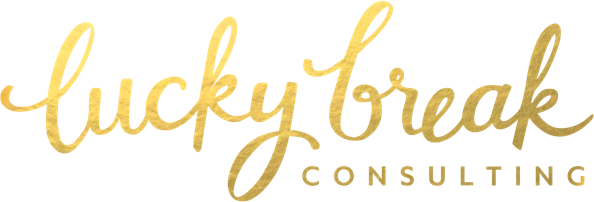
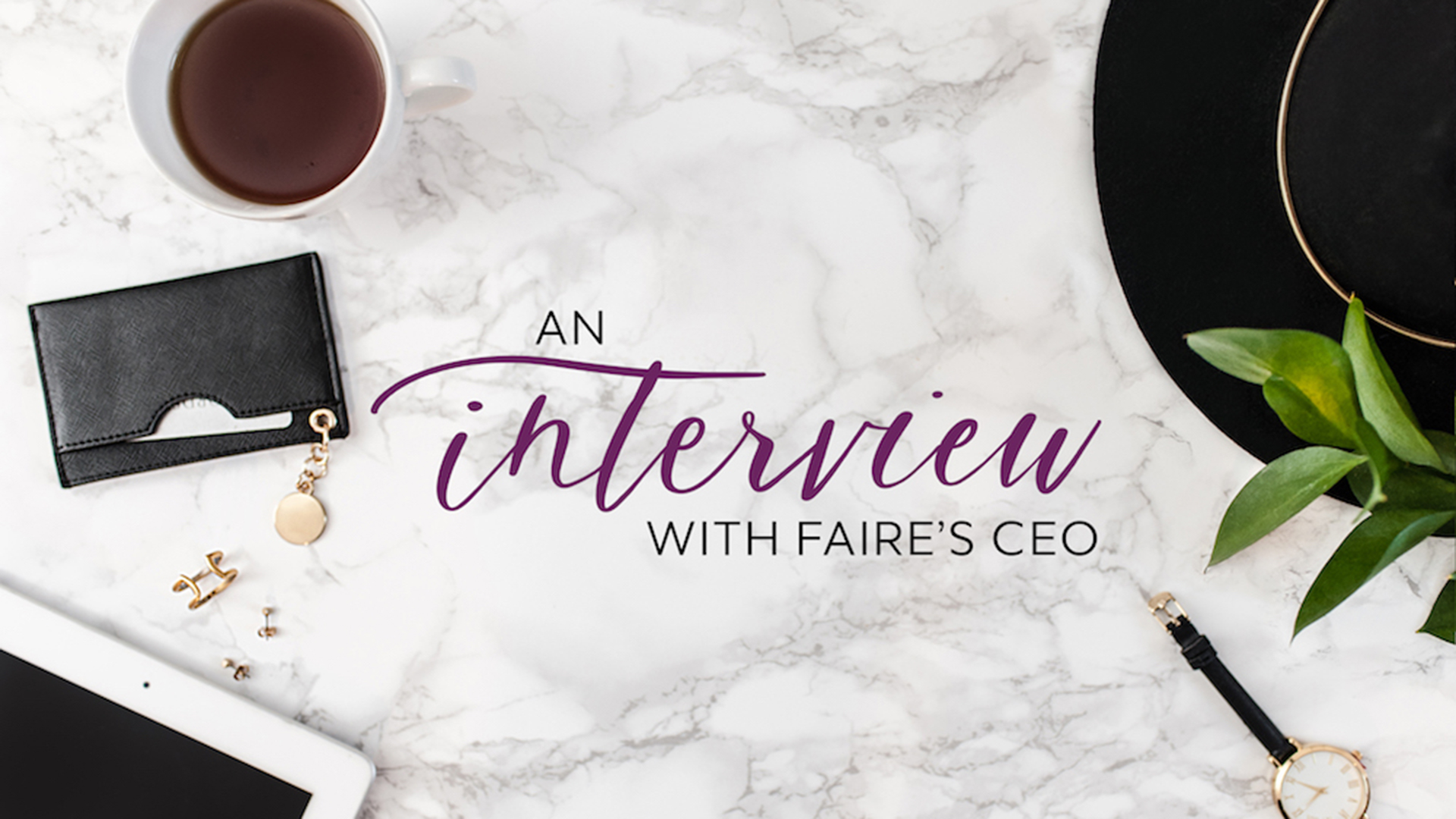
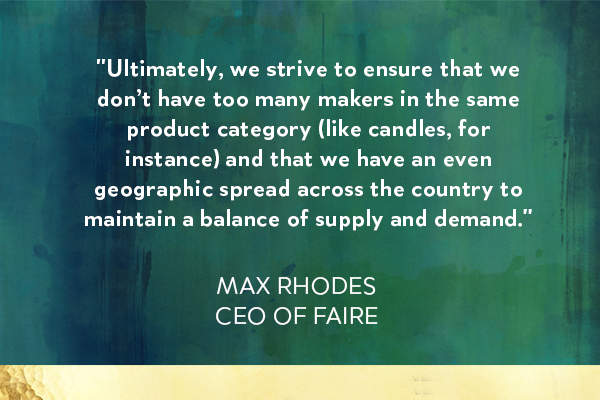
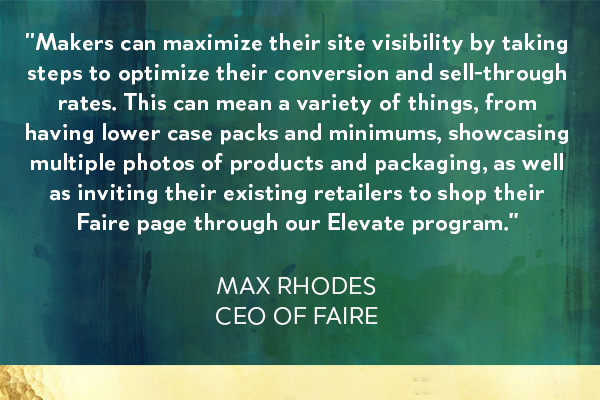
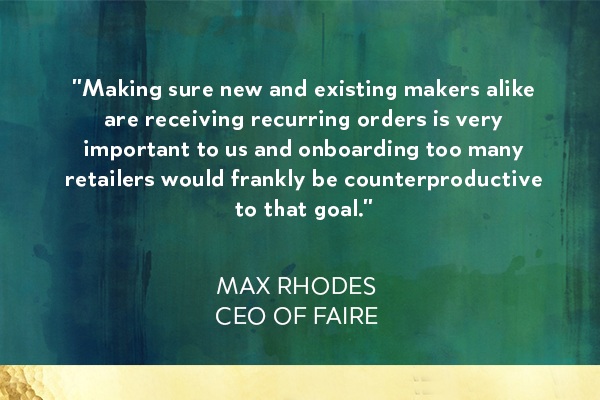
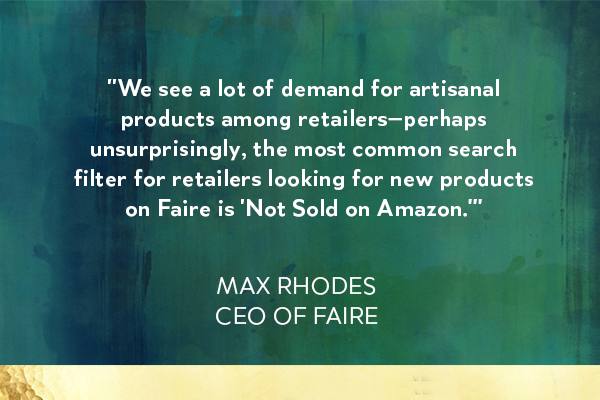
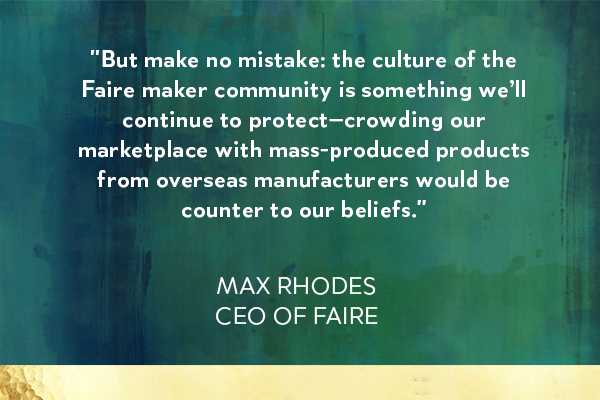
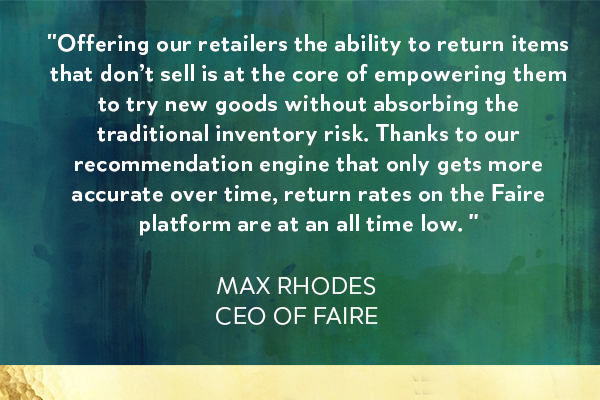
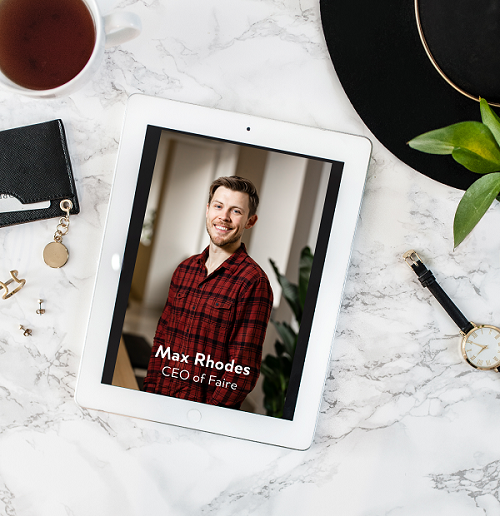
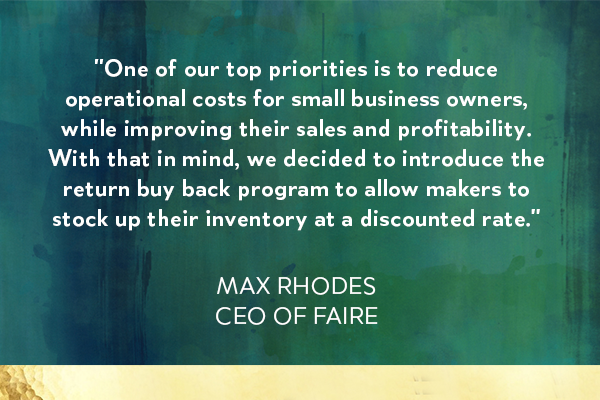
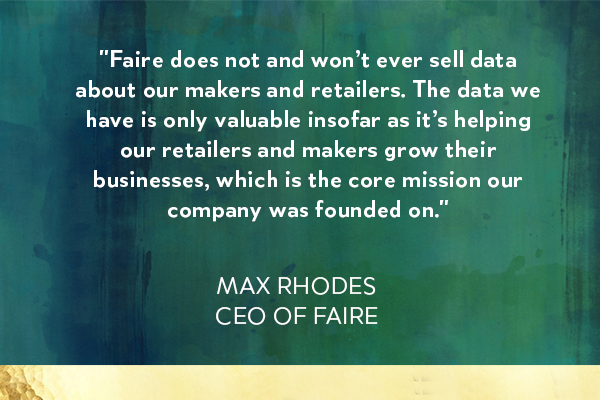
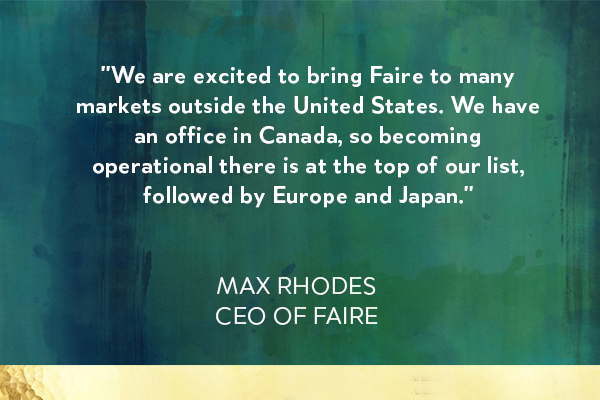
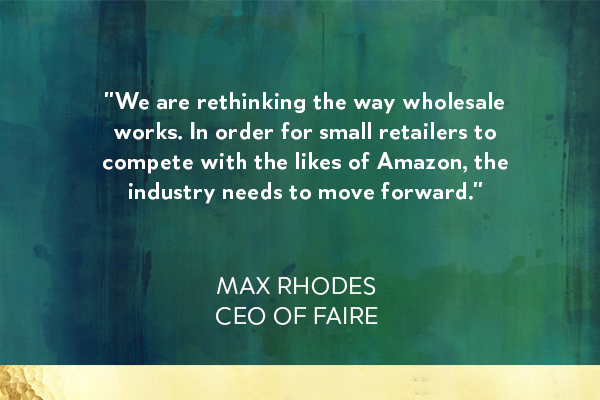


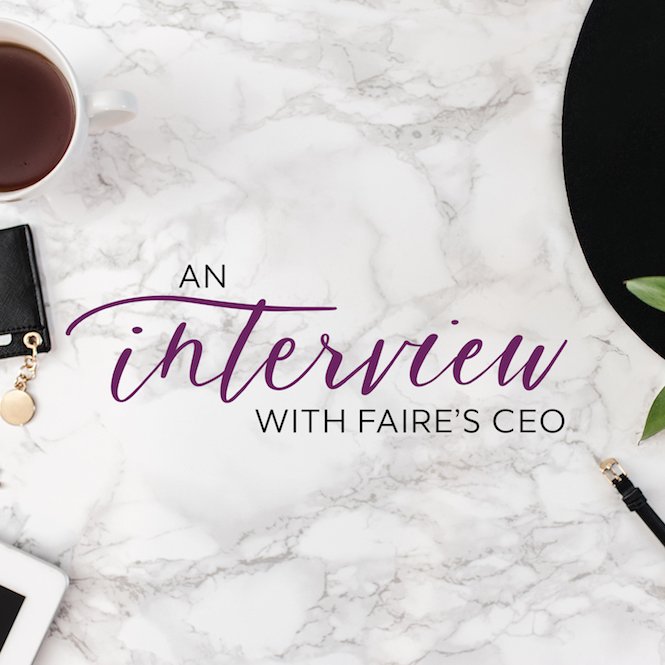
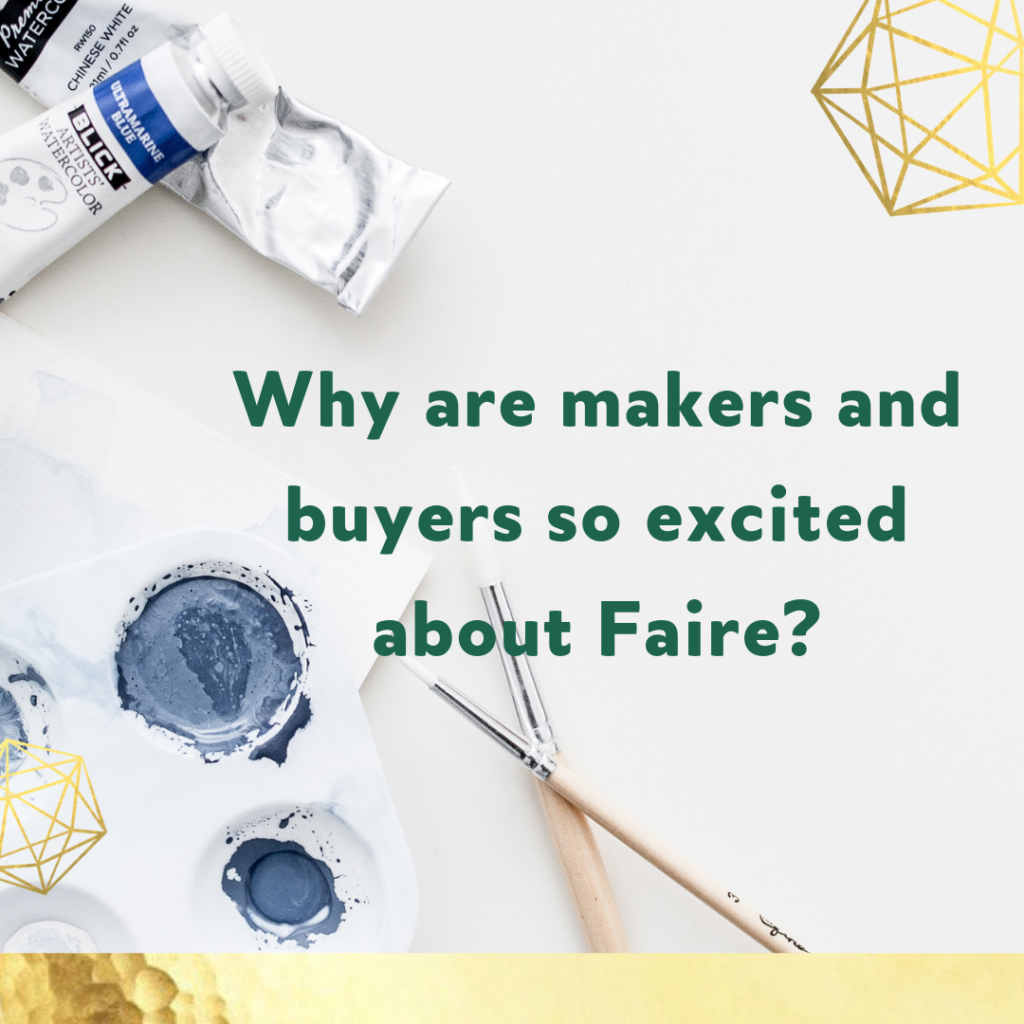
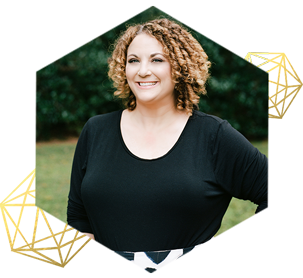
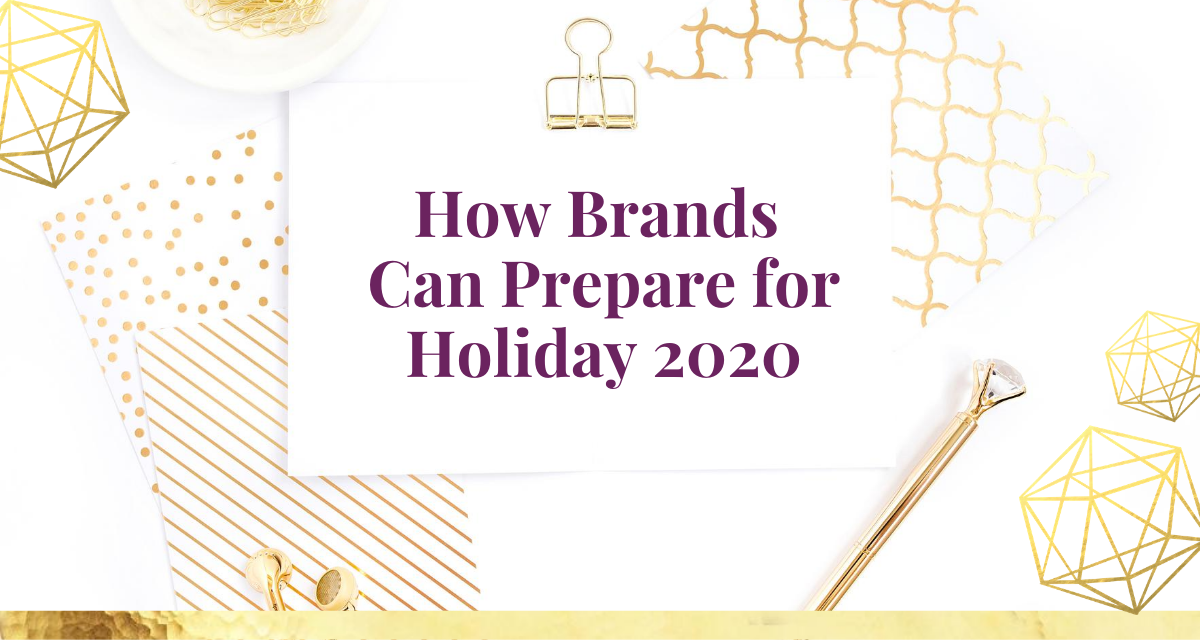

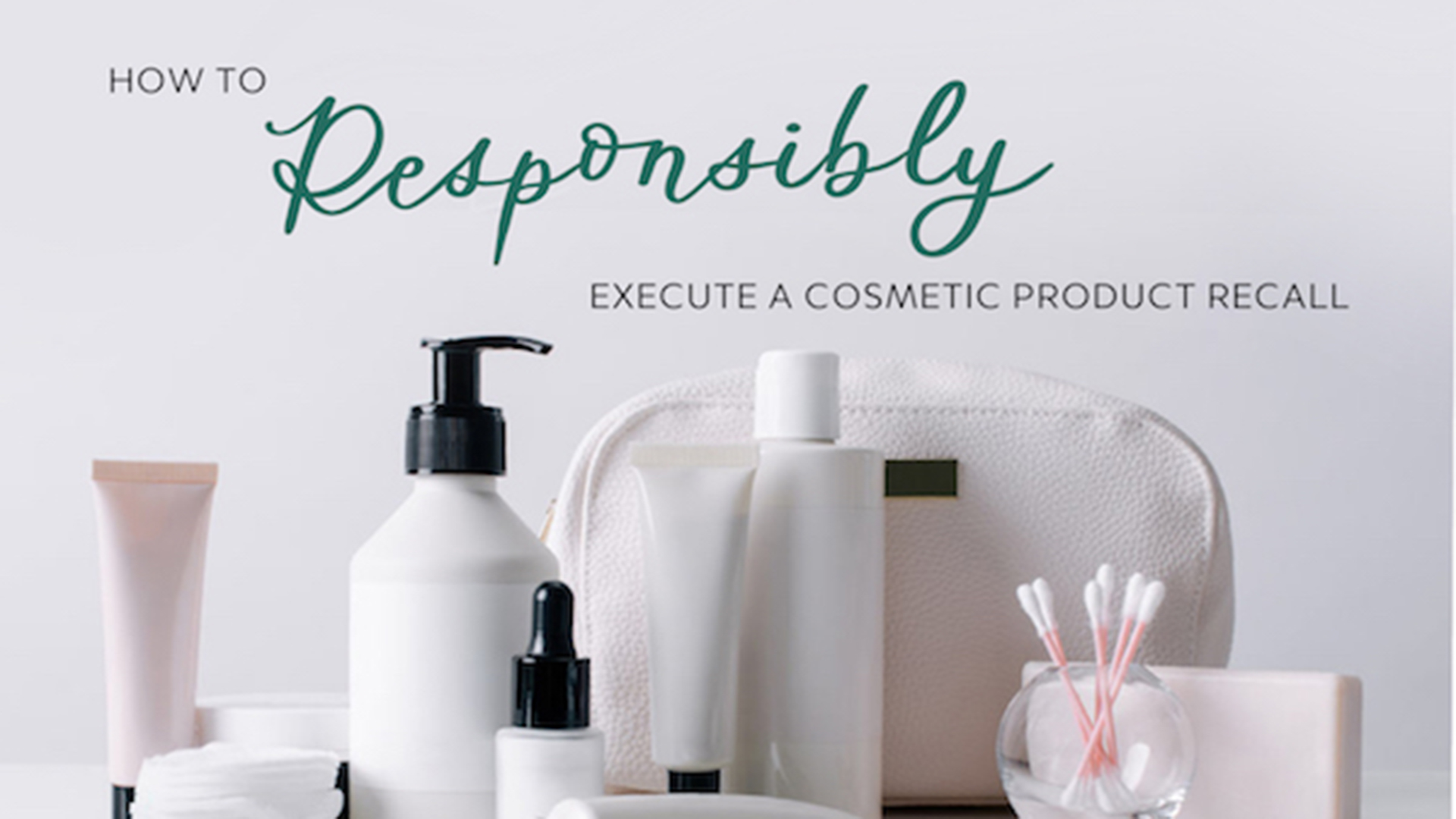
Thanks for taking the time to ask such thoughtful questions Lela! Would love to hear feedback here and happy to answer any follow up questions.
We started with Faire last month. We haven’t had an order yet…our Account Manager looked into this and discovered that one of our pre-packs was listed incorrectly and communicated a very high minimum. The Atlanta Market was very expensive and the traffic in the temp booths was slow. Five days off of my FT job and we were disappointed. We work with sales reps in a certain region and that involves a lot of sample shipping, etc. I have had great customer service from Faire and hope it works. It is interesting to load show lists into Faire and see which retailers are already using the platform. A Iocal clothing boutique told me she saw us on Faire and even though our products don’t work in her shop it was good to hear! I love the idea of Faire and Shopify working together. I do think Faire should amp up their Instagram, follow their makers, give them shoutouts, and interact more. This series has been incredibly informative, Lela. We are very happy with our line card and experience with wholesale match maker. Thank you for putting this all to getter.
I’d like to revisit the sales tax issue. I think the question refers to being able to prove to the government that it is appropriate to NOT collect sales tax, because it was a wholesale sale. Without a tax certificate, and in face of an audit, that it what a maker needs to prove. How will Faire assist Makers in proving this claim? Does Faire require Retailers to provide this information during the vetting process?
I was perusing Faire recently to see if it might be a good fit for my brand. I’m going to be honest, they cannot possibly be appropriately vetting all the artisans listed on their site. In the apothecary/skincare/bath and body categories there were definitely a few brands on there that I would not want to be associated with. A handful, but enough to notice, of them had amateurish labels and poor quality photography and incoherent company profiles – right there some red flags they’re not doing their homework in keeping their vendor list high quality. I was kind of stunned. I’m going to stay away from the platform for now to see where this leads. I have a feeling it’s going to become a free-for-all like etsy.